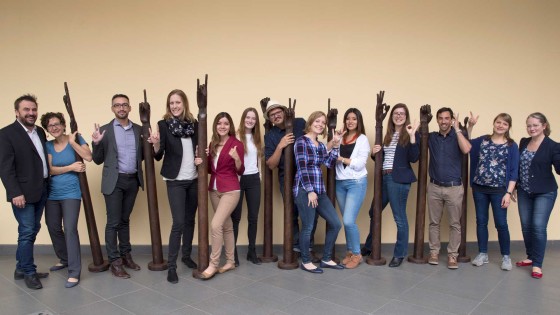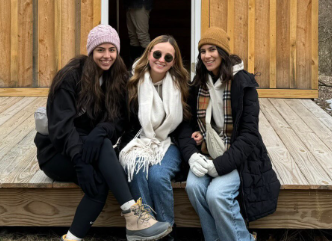Collaborative Online International Learning COIL
COIL (Collaborative Online International Learning) is an educational methodology that promotes international collaboration and online learning through joint work resulting in academic projects, cultural exchange, and the development of global skills via digital platforms.
Benefits
For Students:
- Development of Intercultural Competencies: Students learn to work and communicate effectively with people from different cultures.
- Accessibility and Flexibility: It offers an international experience without the need to travel, making this experience accessible to students with financial, time, or mobility limitations.
For Faculty:
- International Academic Collaboration: Faculty have the opportunity to work with colleagues from different parts of the world, enriching their teaching and research.
- Innovation in Teaching: Integrating COIL into the curriculum fosters innovation in teaching methods and the design of activities and assessments.
For the Institution:
- Curriculum Internationalization: COIL contributes to the internationalization of the curriculum without the need for traditional exchange programs.
- Strengthening of International Collaborations: It promotes and strengthens international relationships and collaborations between educational institutions.
For Learning and Teaching Processes:
- Enrichment of Course Content: Courses are enriched with diverse perspectives and experiences.
- Authentic Learning Experience: COIL offers an authentic learning experience that prepares students for a globalized and diverse world.
Process
- Identification of Partners: Faculty from institutions in different locations connect and agree to collaborate. This connection can be independent or facilitated through the international programs office.
- Course Planning: The partners discuss and design the collaboration, define learning objectives, collaborative activities, and evaluation methods. The necessary technological tools are chosen and configured to facilitate the collaboration (e.g., Zoom video conferences, Padlet discussion forums). They also define whether there will be synchronous moments between classes or if each group of students will need to organize their own meetings.
- Icebreaker Activity: The course objectives and COIL format are presented to the students. International student teams are formed to work together throughout the semester. This can be done before or after the icebreaker activity, depending on the partners' discretion. As an icebreaker activity, students from both countries get to know each other virtually through introductions or video calls.
- Project: Students participate in activities designed to foster collaboration and intercultural learning. This project may consist of research, case studies, online debates, etc. Discussion forums are used for students and faculty to maintain constant communication and collaborate effectively. If synchronous, virtual meetings are scheduled.
- Project Presentation: The teams present their final projects, which may include reports, presentations, videos, or other agreed formats.
- Reflection and Evaluation: Students and faculty reflect on the COIL experience, discuss what they learned, and complete course evaluations.
- Feedback: Feedback is collected from all participants to improve future COIL courses.
COIL ICOP
International Community of Practice (ICOP) of COIL is a dynamic space that brings together national and international faculty in a networking environment. COIL ICOP combines asynchronous training with monthly synchronous sessions to train faculty in the development of COIL projects. This space facilitates the exchange of specific educational tools, COIL experiences, and international education opportunities. ICOP aims to foster peer learning, address common questions, and offer continuous support to ensure the success of COIL projects, thus enriching our global community of educators.
In addition to networking and professional development, ICOP provides exposure to innovative educational tools and continuous support from an online community and a COIL coordinator. This community-focused and continuous professional development approach allows participants to earn a digital credential certifying their experience in the COIL methodology, strengthening their global skills and professional profile.
Experiences
Collaboration between Cornell University and USFQ
A bilateral exchange course in spring 2024 is providing new engaged learning opportunities for students from Ithaca, New York, and Quito, Ecuador. The partnership between Cornell University and the Universidad San Francisco de Quito (USFQ), Cornell’s Global Hubs partner in Ecuador, is fostering collaboration both in the classroom and in the field.
“Think Globally, Act Locally” is the academic exchange program that started in 2024 between the Universidad San Francisco de Quito (USFQ) and Cornell University as part of Cornell's Global Hubs initiative. Rebeca Vera, a Business Administration student, shared her experience with us in this video.
Collaboration between Cornell and USFQ
An international collaboration that takes place every semester, creating new opportunities for hands-on and interdisciplinary learning for design students in Quito, Ecuador, and Mexico. This partnership between Tecnológico de Monterrey and USFQ is part of a COIL project focused on socially impactful design.
As part of a USFQ outreach project with local communities, students from both institutions are working collaboratively to develop user-centered design proposals that address real challenges in the Ecuadorian context. This experience strengthens not only technical and creative skills, but also intercultural and international teamwork abilities.
This initiative reflects both universities’ commitment to promoting internationalization at home through collaborative and contextualized learning.
With the collaboration of:




